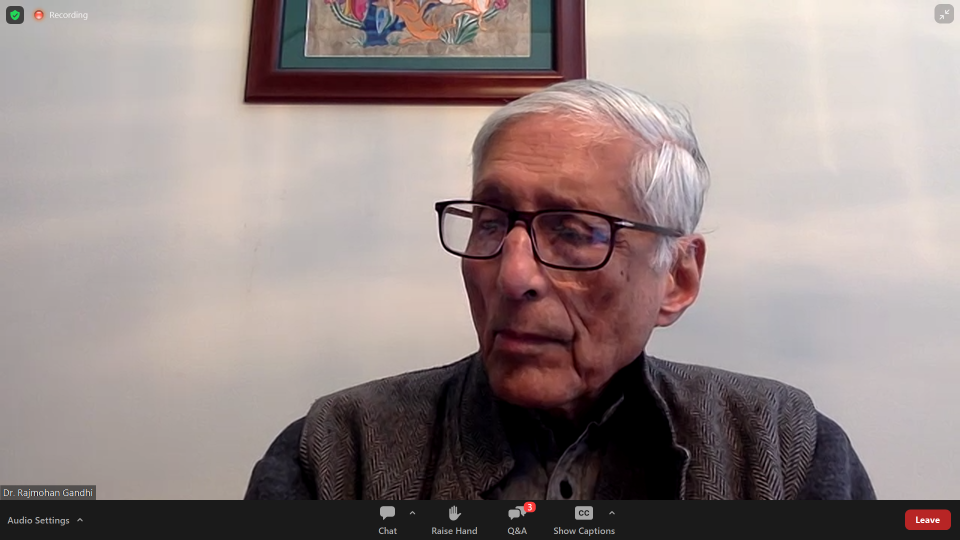Gandhi's grandson speaks at ESU's Frederick Douglass Institute series
- Oops!Something went wrong.Please try again later.
- Oops!Something went wrong.Please try again later.
The East Stroudsburg University community heard from Rajmohan Gandhi, grandson of the Indian independence leader Mahatma Gandhi, as part of the school’s Frederick Douglass Institute Speaker Series on April 4.
The Frederick Douglass Institute, which other Pennsylvania State System of Higher Education schools are also part of, “creates innovative programs to achieve optimal outcomes for underrepresented minority students at the undergraduate, graduate, and postdoctoral levels and to facilitate their progress toward meaningful careers,” according to PASSHE.
Rajmohan Gandhi is a historian whose books include an award-winning biography of his grandfather. He was a professor at the University of Illinois at Urbana-Champaign. “Through writing, speaking, public interventions, and dialogues, he has been engaged for 60 years in efforts for reconciliation and democratic rights,” ESU said.
During the Zoom event, the audience had the chance to ask questions about Gandhi’s life, philosophy and legacy. A few takeaways:
What did non-violence mean to Gandhi?
Asked about his grandfather’s philosophy of non-violence — and that specific word choice, rather than peace — Rajmohan Gandhi shared what Mahatma Gandhi had said when asked why he didn’t talk about love.
Mahatma Gandhi preferred non-violence because “to some, love may suggest to some that there should be no struggle, that we should yield. We should quietly accept oppression and injustice,” Rajmohan Gandhi said.
“‘No no no,’ said Gandhi, ‘I want something that will suggest struggle, something that will suggest dignity.’ So non violence to Gandhi was love or peace plus struggle. It was love or peace plus dignity. It was fight for freedom plus love. It was fight for equality plus love. That is why they chose the expression, and stuck to the expression, non violence,” Rajmohan Gandhi said.

On being Gandhi’s grandson
Rajmohan Gandhi acknowledged that this is “the only lineage I'm familiar with,” so he can’t compare his life to not being Gandhi’s grandson.
“I want to say that I honor my ancestors, but they are not my God. I must heed my conscience, and needing to heed my conscience became a strong imperative in my life. Of course, I must not let Gandhi down. That is a thought that sometimes occurs to me. It's not a bad thought. Nobody should let their parents or grandparents down. But heeding our conscience is perhaps more important,” he said.
“And I should add that, as people were interested in Gandhi, people took a special interest in me, maybe because of my grandfather. But peoples’ interest in Gandhi prodded me to study him as closely as I could. And I was very glad to find that his ideas resonated with my own convictions, with my own efforts,” Rajmohan Gandhi added.
What would Gandhi be doing today?
It’s “not easy to say” what Gandhi would be doing if he were a young person in the United States today, his grandson said, responding to a question about that premise, but “I would say that Gandhi would certainly protest on a carefully chosen issue. He would choose the issue with a lot of thought and deliberation.”
But the specific issue he would choose is not necessarily the most important question, Rajmohan Gandhi said. “We should not ask ourselves, perhaps, ‘What would Gandhi have chosen?’ Gandhi died in 1948. King died in 1968. We now should think for ourselves, what are the issues that trouble us, that distress us?”
This article originally appeared on Pocono Record: Grandson of Mahatma Gandhi speaks at ESU Frederick Douglass Institute

